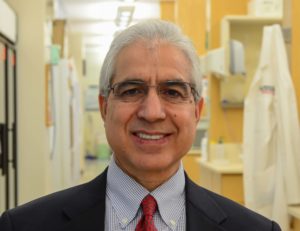Oct. 1, 2017:
Investigator Spotlight
Hamid Band, MD, PhD, Fred & Pamela Buffett Cancer Center
Educational background: M.D. Medical College, Srinagar,, Kashmir University, India; Ph.D. Immunology, All-India Insitute of Medical Sciences, New Delhi, India
Research interests: Our research focuses on two major topics, both geared to understand, and potentially target, the intracellular traffic of cell surface receptors coupled to activation of tyrosine kinase signaling: the CBL-family of ubiquitin ligases, which provides an essential mechanism of negative regulation of receptor and non-receptor tyrosine kinases through ubiquitin-dependent proteasomal and lysosomal degradation; and members of the EHD family of endocytic regulatory proteins, which control subcellular traffic of cell surface receptors involved in a variety of fundamental cellular processes. We use mouse genetic models, cell biology, biochemistry and molecular biology approaches to investigate the roles of these protein families in the context of epithelial (mammary and intestinal) and hematopoietic stem cell homeostasis, immune responses in cancer, and tumor progression and metastasis in breast cancer and myeloid leukemia. A newer interest in the laboratory is on cancer immunology, with a focus on enhancing the efficacy of CAR T-cell immunotherapy of solid tumors.
Little-known facts about Dr. Band:
- As a child, I walked a mile and a quarter each way to attend middle school, rain or shine. Thank God, they gave us six weeks off in winter.
- In 1980/1981, I applied to Ph.D. programs at five U.S. universities and was rejected by all. About eight years later (three years after receiving my official Ph.D. degree from India), I accepted my first Ph.D. student and taught a course in immunology at one of those universities — Harvard.
- Except for Wheatfield’s Bakery in Omaha, I rarely buy foods without scanning the nutritional information on the package.
About the Big Ten Cancer Research Consortium: The Big Ten Cancer Research Consortium was created in 2013 to transform the conduct of cancer research through collaborative, hypothesis-driven, highly translational oncology trials that leverage the scientific and clinical expertise of Big Ten universities. The goal of the Big Ten Cancer Research Consortium is to create a unique team-research culture to drive science rapidly from ideas to new approaches to cancer treatment. Within this innovative environment, today’s research leaders collaborate with and mentor the research leaders of tomorrow with the unified goal of improving the lives of all patients with cancer.
About the Big Ten Conference: The Big Ten Conference is an association of world-class universities whose member institutions share a common mission of research, graduate, professional and undergraduate teaching and public service. Founded in 1896, the Big Ten has sustained a comprehensive set of shared practices and policies that enforce the priority of academics in the lives of students competing in intercollegiate athletics and emphasize the values of integrity, fairness and competitiveness. The broad-based programs of the 14 Big Ten institutions will provide over $200 million in direct financial support to almost 9,500 students for more than 11,000 participation opportunities on 350 teams in 42 different sports. The Big Ten sponsors 28 official conference sports, 14 for men and 14 for women, including the addition of men’s ice hockey and men’s and women’s lacrosse since 2013. For more information, visit www.bigten.org.














Subscribe to the Big Ten CRC Newsletter X
X Facebook
Facebook YouTube
YouTube